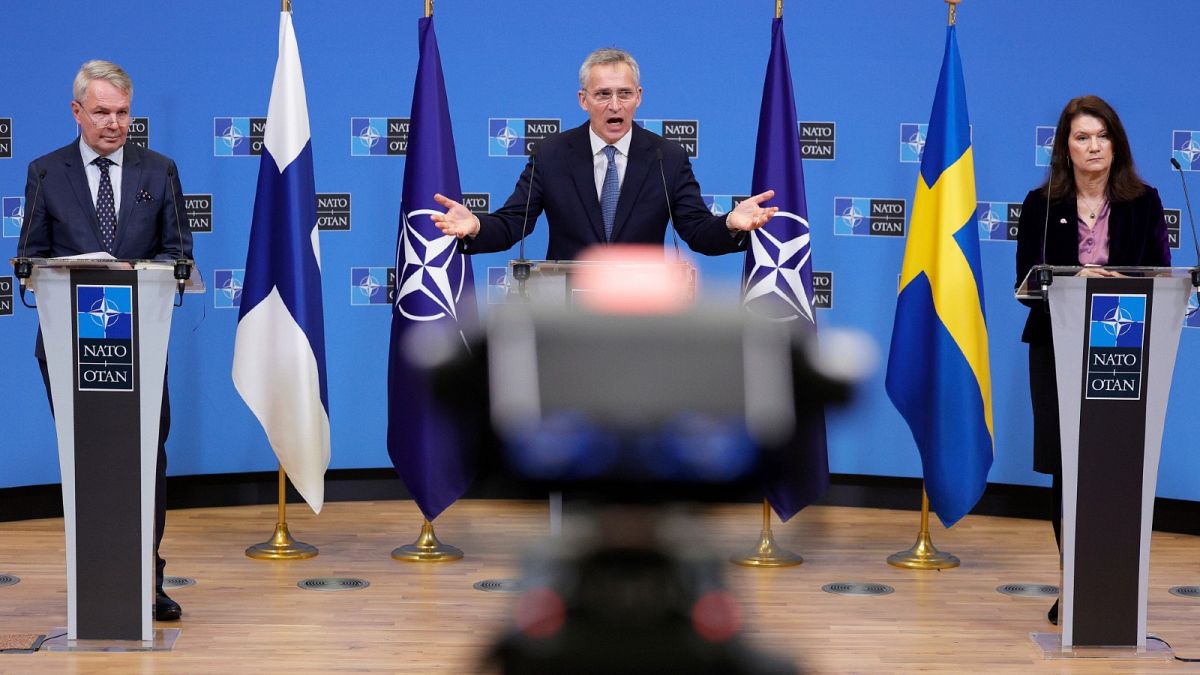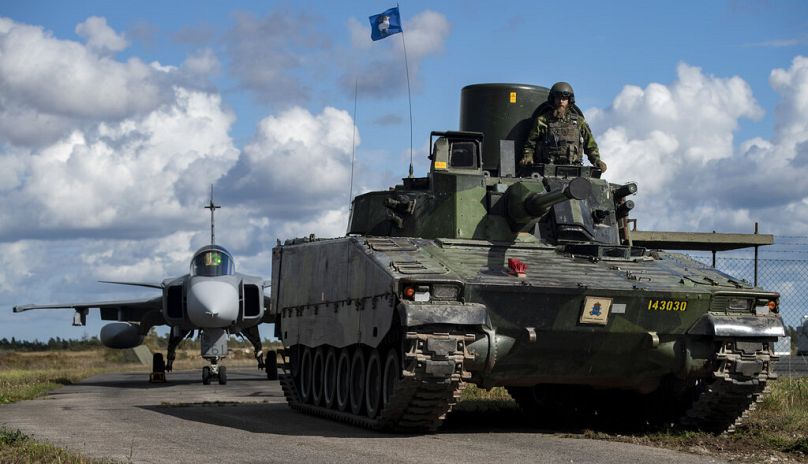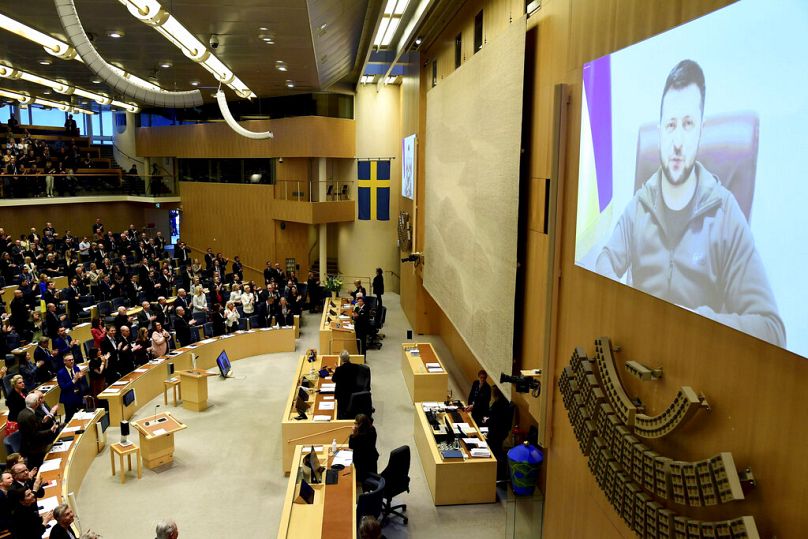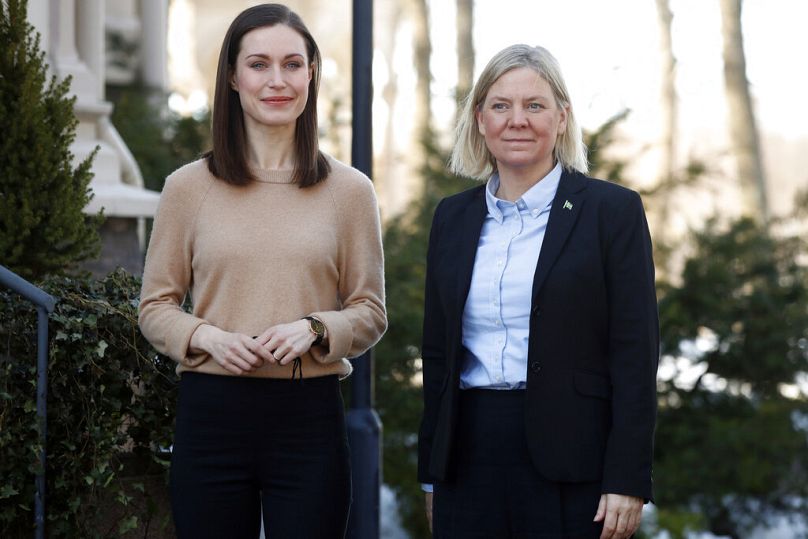As political and public support for joining NATO continues to grow, Sweden's Social Democrat government looks set to change its foundational resistance to membership of the military alliance.
For decades the conventional wisdom of security policy in the Nordic region held that out of the two countries still not NATO members, Sweden would be most likely to apply first, and then, Finland would follow along.
After all, a similar pattern had occurred in 1995 when both countries joined the European Union, and anyway, opinion polls in Sweden had always been more favourable to joining the military alliance, with support in Finland languishing around 20-25% for as long as polling had been carried out on this question.
But in the last few months, conventional wisdom has been turned on its head.
Even before the Russian invasion of Ukraine, there's been something of a role reversal between the Nordic neighbours: with Finland being notably more eager in terms of politics and public opinion to apply for NATO membership; and Sweden, in particular Prime Minister Magdalena Andersson and her Social Democrat minority government, lagging behind.
"Traditionally there's been three 'vetoes' against NATO membership in Sweden. One has been popular opinion, one has been Finland, and one has been the Social Democrats," says Oscar Jonsson, a researcher at the Swedish Defence University in Stockholm.
"Needless to say public opinion, and Finland, is shifting rapidly and causing a lot of pressure on the Social Democratic Party," he tells Euronews.
This year there's been a frantic flurry of international diplomacy to make sure the Swedes are on the same page as the Finns on a possible NATO membership application.
That has included a phone call from US President Joe Biden and Finnish President Sauli Niinistö to Magdalena Andersson from the White House; a visit by Andersson to Helsinki for discussions with Finland's PM Sanna Marin; and a regular tempo of bilateral meetings between foreign and defence ministers.
Still, the Swedish prime minister remained hesitant until recently about her country's NATO position.
In early March she said it would "further destabilise" that part of Europe and "increase tensions" if Sweden joined. But by the end of the month that position had changed, a sign of the shifting discussion within the Social Democrats and feeling some heat from Finland, with Andersson now saying "I do not rule out NATO membership in any way."
Where does Swedish public opinion sit?
The Swedish public is more sure about wanting to join NATO than ever before, according to a string of opinion polls, but the change in attitudes has been less profound than in Finland.
"I think we had a shift in public opinion as well as Finland did, but the Finns had a much larger shift" explains Anna Wieslander, Director for Northern Europe at the Atlantic Council.
"One of the reasons we experts estimated that Sweden would move first is that since 2013 we had support that could be up to 35% pro-NATO and now it's around 50% in polls, which is directly tied to Russia's full-scale invasion of Ukraine," she tells Euronews.
With parliamentary elections coming up in September the NATO question is, for the first time, an election issue, especially with the centre-right Moderate Party pledging to apply for NATO membership if they become the biggest party and form the next government.
"NATO has frankly never been seen as an election winner in Sweden so there's never really been any desire to push political conflict over it. This time around, there's been a historic shift in both the opinion and with Finland driving this," said Jonsson.
And Swedish voters are weighing up the issues for September's elections against the backdrop of Russia's ongoing invasion of Ukraine.
"Defence has climbed to become the top election issue for the public, and I have never heard of anything like it. I've been doing security and defence for more than 25 years and we are never on top of any election debate, it's always about welfare or schools or crime," said Wieslander.
"Now we are a hot topic for a change!"
So what does Sweden's political landscape look like?
There are currently eight parties in the Swedish parliament, the Riksdag, and four of them are in favour of joining NATO. But even with those four parties together there's still not a majority.
However, the third biggest party in parliament, the right-wing populist Swedish Democrats, have recently said they're now open to possible NATO membership and are discussing the issue internally -- signalling another likely change in policy strategy.
At that point, there would be a pro-NATO majority in the Riksdag, a majority of public opinion supporting a membership application, and pressure from Finland, which could force the hand of Magdalena Andersson's party.
A number of influential figures in the Social Democrats have also come out in support of NATO membership, a cultural shock for a political movement whose very identity and history are firmly rooted in its stance against joining NATO.
"I think in the last days the signals here in Stockholm are that the Social Democrats will join not because they want to, but because they have to out of necessity," said Wieslander.
The Swedish Defence University's Jonsson says he thinks there's also a higher degree of confidence in the political leadership in Finland, and how they handle foreign and security policy, than in Sweden.
"And I think that Finland is better at making this a question for the good of the state rather than what is good for party politics. I think that's one reason why Finland is pioneering this change."
Will Sweden and Finland move together with a NATO application?
The messaging from both Stockholm and Helsinki has always been consistent: that any application to join NATO should be made together, in cooperation, with no surprises.
Finland has its own quite complicated constitutional back-and-forth to go through between government, president and parliament during the spring before deciding how to proceed. The main players, despite whatever views they might have held before, are now indicating that opinion polling is enough of a measure of public attitudes to proceed -- and no referendum on membership would be needed.
Sweden's prime minister has also said there would be no need in her country for any referendum.
"My perception is that Finland is close to it, or maybe even made a decision already," states Jonsson.
The political situation is not nearly so advanced in Sweden however, so is there a risk Finland could be ready to apply while Sweden is still talking about it, even if there is a desire to work in tandem? Experts say it's possible, but unlikely.
"Finland will decide anyway, but they would prefer to do it with the Swedes," said Wieslander.
"And I also think that NATO would prefer Sweden and Finland to join together."















